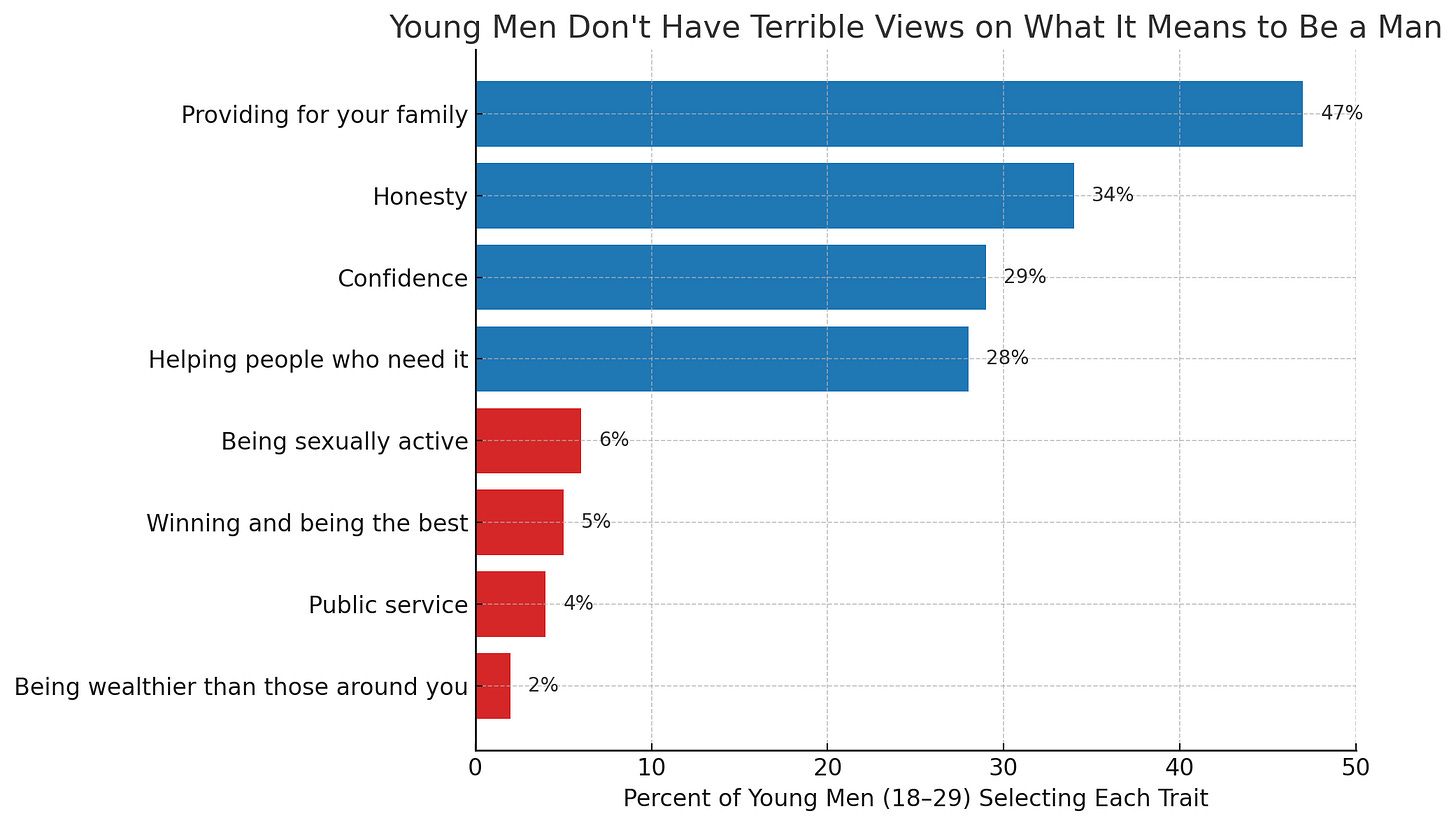Young men have pretty positive views on manhood
There's too much moral-panicking and blaming going on around young men
The tone of conversation about young men, especially on the political left, really needs to change. The vibe you get right now is that young men are turning en masse to the right, adopting misogynistic outdated views about gender, masculinity and gender roles.
But: it’s mostly not true. And saying that it is will justifiably piss off a lot of young men.
None of this is to deny that there’s a contest for the allegiance of young men. There always is. Right now this has a party political dimension given the results of the 2024 election.
But the idea that young men are in general swinging in a reactionary direction, lured by the pied pipers of the “manosphere”, is false. To be clear, there’s a lot of bad stuff online, and the older, narrower definition of the manosphere is worthy of serious investigation. (I’ve just reviewed James Bloodsworth’s book on this, mostly positively.)
I’m worried that the term “manosphere” is going to go through a similar journey to “toxic masculinity”, simultaneously being broadened massively beyond it’s original parameters and breaking out of academic circles and into mainstream discourse.
But that’s for another day. Back to the actual views of young men not being as curdled as much of the narrative would suggest. I’ve written a little about this before: see for example my piece with Allen Downey of
: “No, young men are not turning away from gender equality”.A new poll of men aged 18-29 by the
adds a little more data to the question. Conducted by YouGov, it has a sample size of 1,000 so all the usual caveats must be applied.One of the most interesting questions in the survey is about what makes a man. The results are, I think, pretty encouraging. In the chart below I show the top four answers and the bottom four answers:
We could have a long argument about whether a desire to “provide for your family” hews too closely to traditional gender roles. But it’s not exactly a horrible idea. And the next three - honestly, integrity and helpfulness - are surely beyond reproach as ideals.
Meanwhile “being wealthier than those around you”, “winning and being the best” and “being sexually active” all rank in the lowest-ranked four attributes of being a man. (Public service was in there too, but that’s kind of hard one to interpret honestly). This suggests that even if young men are consuming online content promoting alpha male stuff, they are not simply adopting it wholesale.
Another poll by Paid Leave for All (n=1,000) found similar levels of support for being a provider; but also a high share saying that caring for kids was manly. As the group summarized:
Most men, especially dads, say that supporting his family financially (80% among men overall, 84% among dads) and taking care of his kids (76% and 83%) make a man more masculine, even more than say the same of working a full-time job (71% and 76%), which many traditionally associate with masculinity.
It’s important to balance reasonable criticism of online misogyny with some generosity of spirit to the actual views of actual men. As I write in my Literary Review piece (to be clear using the older, narrow definition of the manosphere):
The manosphere itself is trapped in adolescence, the period of separation from the birth family. Young men of course need to separate themselves from their own families. But following this separation, they should mature into adult relationships, ones which make demands of them. To be a mature man is to give more than you get. It is not about freedom; it is about service.
‘Every known human society rests firmly on the learned nurturing behaviour of men,’ wrote the anthropologist Margaret Mead. But she also warned: ‘This behaviour, being learned, is fragile, and can disappear rather easily under social conditions that no longer teach it effectively.’ Boys become men when they have learned to nurture, to provide, to generate a surplus. Men like Tate are not leading men out of the wilderness; they are taking them into it.
We need to take seriously the kaleidoscopic landscape in which modern, mature masculinity is being formed. But we also have to meet our boys and young men where they actually are rather than where the worst caricatures would have us believe they are landing. If we’ve learned anything from the last few years, it is surely that over-generalizing about the views of young men does not end well, for them of for us.






I do in-depth research interviews with men about manhood and their motivations. These men are from all walks of life. During these interviews I ask men about their earliest masculine influences, current masculine role models and to describe times when they've felt most and least like a man. In a recent study I asked young men who were still living with their parents all of these questions and more. These study participants could have been working or not but were out of school and at the age when they would traditionally have been expected to be on their own. Honestly, I wanted to get underneath the stereotype of the freeloading gamer guy sitting in the basement and mooching off of his parents.
Among the men I talked to, it was clear this stereotype was far from the truth. The underlying motivation that kept them at home was feeing safe -- financially and emotionally. They also felt more connected than they thought they would feel living on their own.
Relative to Mr. Reeves' piece, four themes emerged among the men they admired and the man they wanted to be. Providing, protecting, persevering and being present. All of the young men told stories of fathers or other male figures who demonstrated these characteristics.
I don't believe these men -- and the vast majority I've talked with in other studies -- want to exhibit a traditional or more modern form of masculinity. They just don't think or talk that way. These narratives mean less to them than just being a good person.
I appreciate your research but I'm not sure the top 3 areas are where men feel emasculated. It is how they are interpreted and expressed. For example, if a young man wishes to stay a virgin, get married and have kids, there are left leaning young women that will find a way to label this as toxic and predatory. I have seen this first hand.
It feels like feminist groups want to control how men express themselves even if it doesn't harm them but they dont want men to do the same to them.